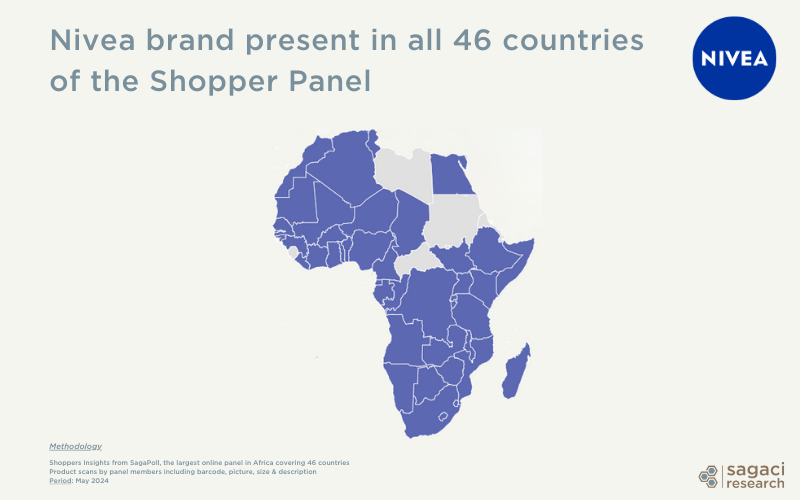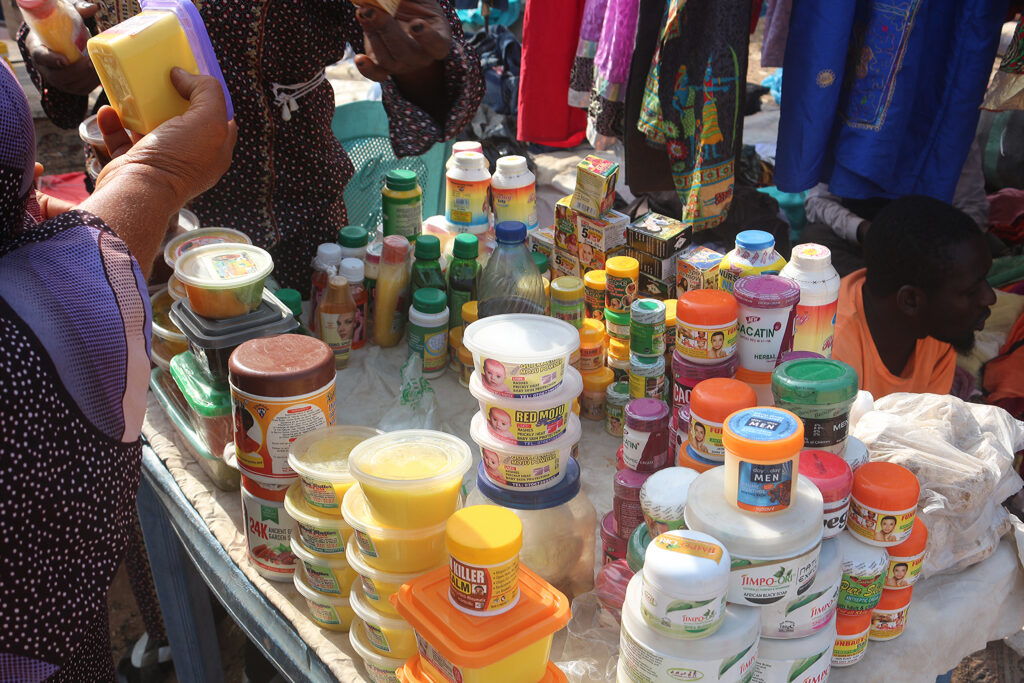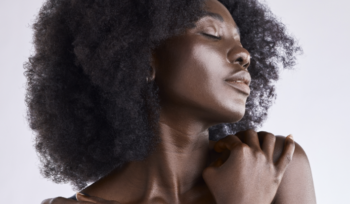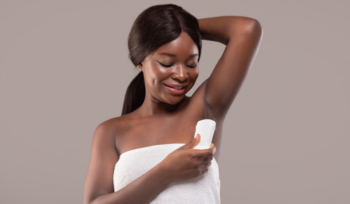- 19/06/2024
- Posted by: ilana.czerwinski
- Categories: Articles, Beauty & Personal Care, Consumer Goods / FMCG, SagaShopper

Driven by demographic and economic expansion, the market for beauty and personal care brands in Africa is experiencing unprecedented growth. As the rivalry between local and international brands heats up, let’s delve into these brand performances across the continent. Specifically, we explore which brands boast the widest coverage in terms of market presence. Leveraging product scans data from the SagaPoll online Shopper Panel currently covering 46 African countries, we find some interesting insights on the African personal care market.
Top beauty and personal care brands in Africa
Insights from our pan-African Shopper Panel reveals Nivea as the personal care brand with the highest penetration in Africa. Across its face care, skincare, body care categories, Nivea is indeed found in more countries within our panel than all other personal care brands available in Africa. With its numerous SKUs, the German brand from Beiersdorf can be found in 100% of the 46 African countries covered by the Shopper Panel.
Below is the ranking of the Top 20 personal care brands in Africa based on market presence in the Shopper Panel:
| Brand | # countries where the brand is found | Manufacturer | Origin |
| Nivea | 46 | Beiersdorf | Germany |
| Dove | 45 | Unilever | GB |
| Vaseline | 45 | Unilever | GB |
| Colgate | 43 | Colgate-Palmolive | US |
| Johnson’s | 41 | Kenvue | US |
| Axe | 39 | Unilever | GB |
| Brut | 36 | Unilever | GB |
| Garnier | 35 | L’Oréal | FR |
| BIC | 35 | BIC | FR |
| Clere | 35 | Clere | SA |
| CeraVe | 34 | L’Oréal | FR |
| Amalfi | 34 | Romar | SP |
| Rexona | 33 | Unilever | GB |
| Gillette | 33 | P&G | US |
| L’Oréal | 33 | L’Oréal | FR |
| Old Spice | 33 | P&G | US |
| Disaar | 32 | Guangzhou Livepro Beauty Cosmetic Co | China |
| Clairmen | 32 | Dream Cosmetics | CIV |
| Adidas | 32 | Coty | FR |
| Palmolive | 32 | Colgate-Palmolive | US |
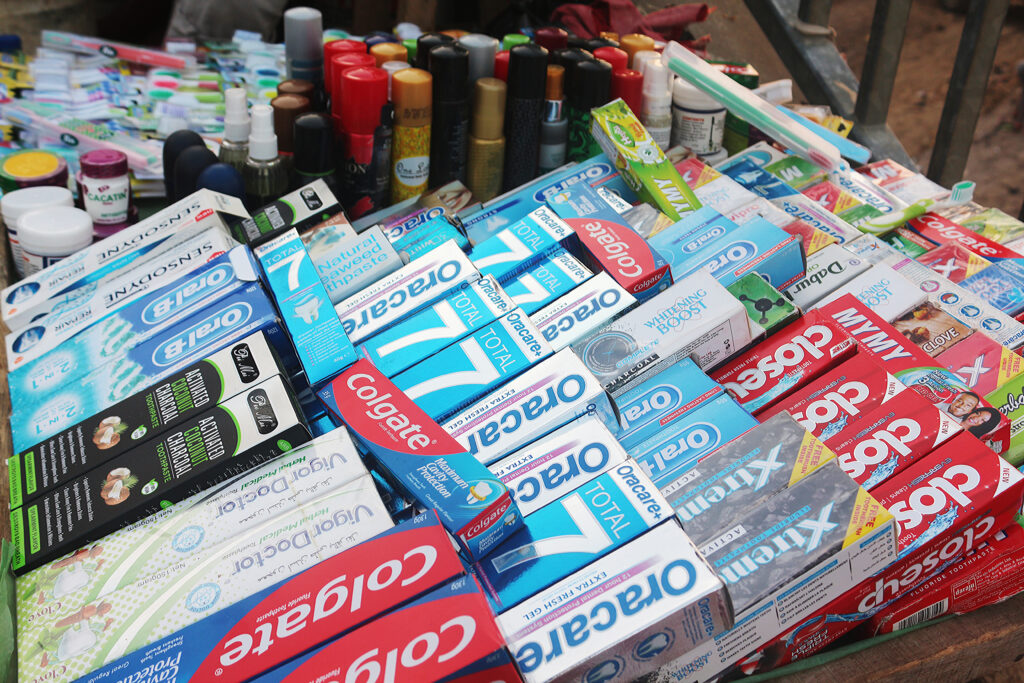
Strong international personal care brands, but for how long?
This ranking underscores the significant role of large established international players in the personal care industry in Africa, particularly in terms of their extensive coverage across the continent. These companies often hold an advantage due to their developed distribution expertise, global presence, and strong brand recognition. Agility in operating in Africa is also crucial. For example, Nivea has shown flexibility in their distribution strategy by not only targeting modern trade channels but also embracing traditional retail, which remains the most significant distribution channel in Africa. Additionally, they extend their reach by selling products also in pharmacies and gas stations.
Large conglomerates like Unilever, which has five brands in the Top 20 ranking (incl. Dove and Vaseline), have leveraged their proven marketing and logistical capabilities to establish a robust presence across numerous markets. However, recent trends have not been favorable for foreign players. For example Unilever has been scaling down some of its activities in Nigeria, as well as P&G and GSK, all citing an unfavourable business environment. Unilever has also been struggling in recent years in Côte d’Ivoire due to intense local competition in a market with low barriers to entry.
Increasing competition from local personal care brands in Africa
Indeed, maintaining a presence across the African continent is no easy feat for international brands. The African market is highly fragmented, comprising 54 countries, over 40 different currencies, hundreds of languages, and diverse local cultures and consumption habits. But even more importantly lately, local competition is intensifying, with robust local cosmetics groups emerging as key players both locally and regionally. For instance, West African companies such as Sivop, Nouvelle Parfurmerie Gandour (NPG), Dream Cosmetics and GDK, all founded in Côte d’Ivoire, have expanded their presence to numerous markets. Sivop alone operates in 25+ countries. These companies are becoming market leaders, benefiting from a strong local footprint, an in-depth understanding of consumer needs, lower currency risks and profitability pressure.
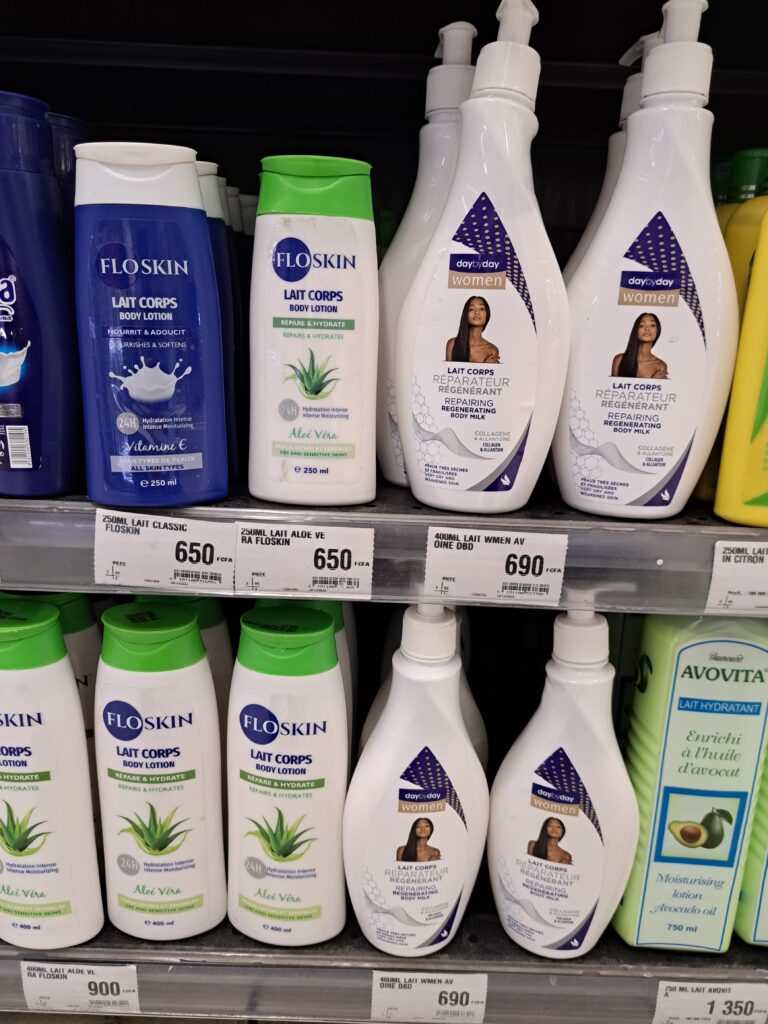
For further insights on this topic, you can also check the report on the Beauty sector in Africa, exploring consumers priorities and trends. Our Product Reports also provide deep dives into Personal Care categories, covering metrics such as number of SKUs, brands, popular packaging types, formats, prices, and more. For example, you can explore the Lip products market in Nigeria.
Find out more about Beauty consumer trends in Africa
By leveraging the comprehensive data from SagaPoll, businesses can gain invaluable insights into the beauty market in Africa and better understand the African consumer trends shaping the region.
Reach out to our team at contact@sagaciresearch.com or click below to explore how our data can enhance your market strategies and consumer insights.
Methodology
Shoppers Insights covering 46 countries, leveraging SagaPoll, the largest online panel in Africa.
Product scans by panel members. Data captured includes barcode, picture, size & description
Period: May 2024



